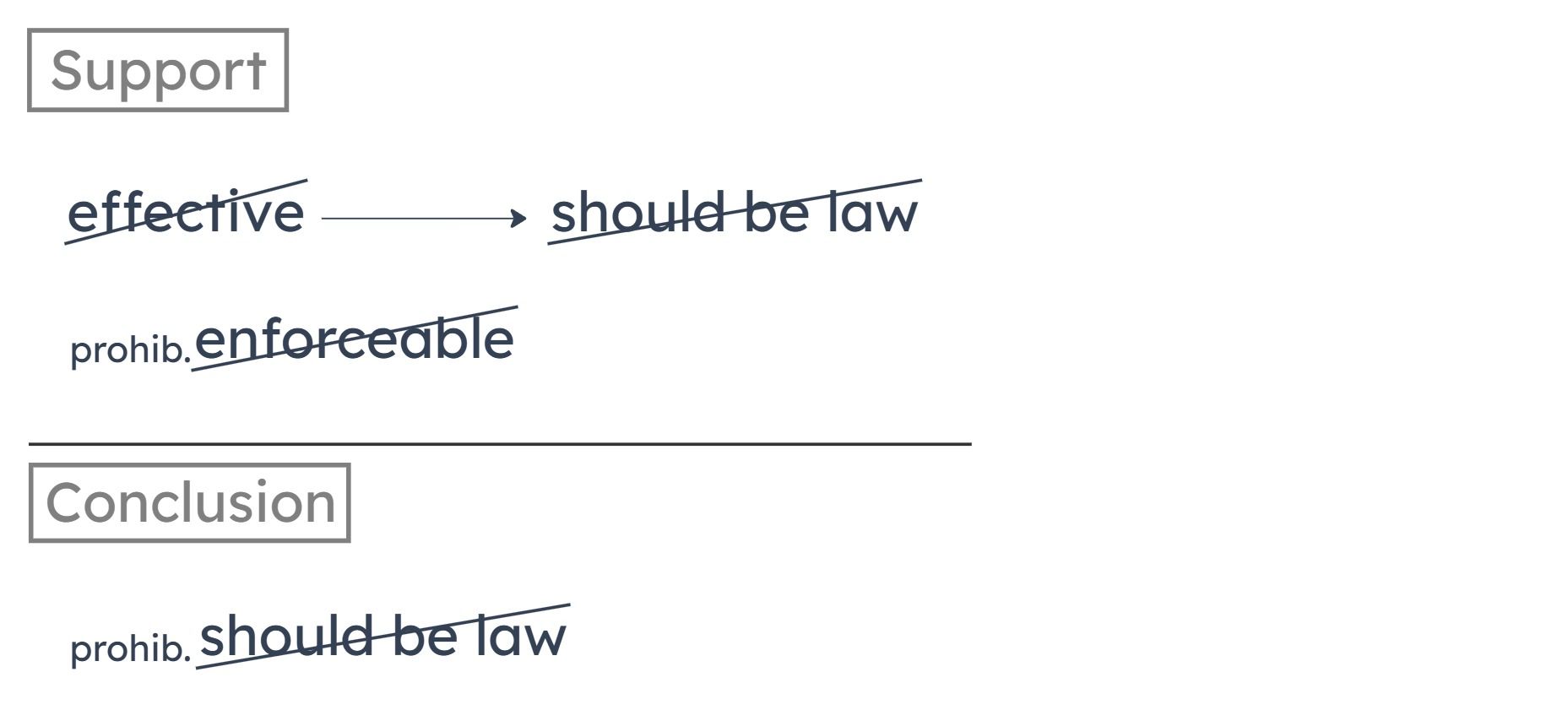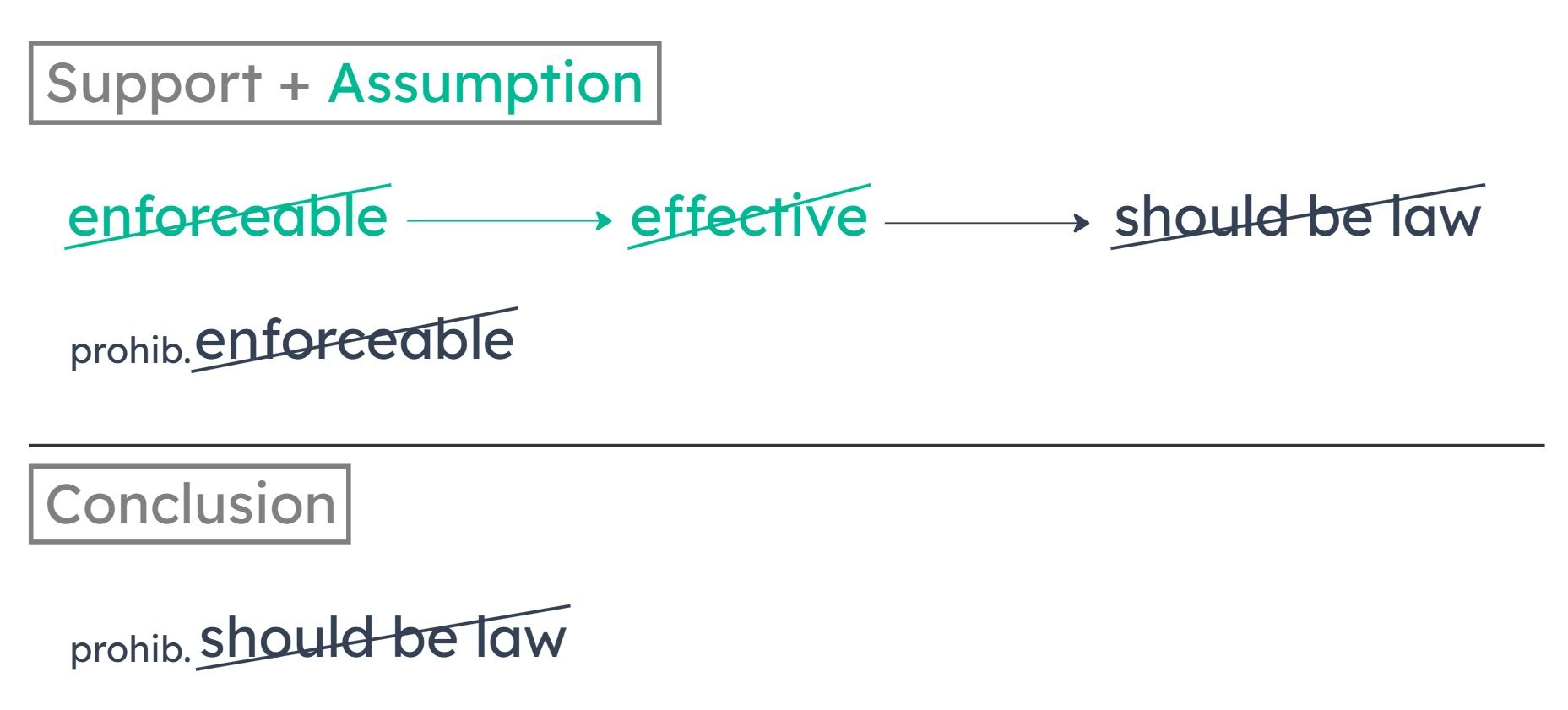LSAT 101 – Section 2 – Question 21
LSAT 101 - Section 2 - Question 21
December 1997You need a full course to see this video. Enroll now and get started in less than a minute.
Target time: 1:36
This is question data from the 7Sage LSAT Scorer. You can score your LSATs, track your results, and analyze your performance with pretty charts and vital statistics - all with a Free Account ← sign up in less than 10 seconds
| Question QuickView |
Type | Tags | Answer Choices |
Curve | Question Difficulty |
Psg/Game/S Difficulty |
Explanation |
|---|---|---|---|---|---|---|---|
| PT101 S2 Q21 |
+LR
| Sufficient assumption +SA Conditional Reasoning +CondR Link Assumption +LinkA Value Judgment +ValJudg | A
67%
170
B
11%
162
C
19%
163
D
2%
160
E
1%
149
|
155 162 169 |
+Hardest | 150.088 +SubsectionMedium |
Summary
The conclusion is that there shouldn’t be a legal prohibition against gambling. This is based on the following:
Gambling laws can’t be enforced.
If a law is not effective, it should not be a law.

Gambling laws can’t be enforced.
If a law is not effective, it should not be a law.

Missing Connection
The second premise (if a law is not effective, it should not be a law) gives us a way to prove that something should be a law. So if we can learn that gambling laws aren’t effective, we can prove that they shouldn’t be laws. The first premise establishes that gambling laws can’t be enforced. There’s a missing link between “can’t be enforced” and “not effective.” We should go to the answer looking for “If a law can’t be enforced, then it’s not effective.” Or, the contrapositive: “If a law is effective, it has to be enforceable.”
A
No effective law is unenforceable.
This establishes that if a law is effective, it must NOT be UNenforceable. Take away the double negative and this means, if a law is effective it must be enforceable. This establishes that since gambling laws aren’t enforceable, they cannot be effective. 

B
All enforceable laws are effective.
This means that if a law is enforceable, it’s effective. This reverses what we’re looking for. (B) doesn’t prove that if a law isn’t enforceable, it can’t be effective. In other words, (B) still allows for gambling laws to be effective, even though they’re not enforceable.
C
No legal prohibitions against gambling are enforceable.
A premise already establishes that gambling prohibitions are not enforceable. (C) doesn’t establish that the gambling prohibitions are not EFFECTIVE. There’s a difference between “not enforceable” and “not effective.”
D
Most citizens must agree with a law for the law to be effective.
The premises don’t give us enough to establish that most citizens don’t agree with gambling laws; so (D) doesn’t establish that gambling laws aren’t effective. We know that most citizens recognize that they’re not enforceable, but this doesn’t imply that they don’t agree with the laws.
E
Most citizens must agree with a law for the law to be enforceable.
The premises already establish that gambling laws are not enforceable. (E) doesn’t establish that the laws are not EFFECTIVE. There’s a difference between “not enforceable” and “not effective.”
Take PrepTest
Review Results
LSAT PrepTest 101 Explanations
Section 1 - Reading Comprehension
- Passage 1 – Passage
- Passage 1 – Questions
- Passage 2 – Passage
- Passage 2 – Questions
- Passage 3 – Passage
- Passage 3 – Questions
- Passage 4 – Passage
- Passage 4 – Questions
Section 2 - Logical Reasoning
- Question 01
- Question 02
- Question 03
- Question 04
- Question 05
- Question 06
- Question 07
- Question 08
- Question 09
- Question 10
- Question 11
- Question 12
- Question 13
- Question 14
- Question 15
- Question 16
- Question 17
- Question 18
- Question 19
- Question 20
- Question 21
- Question 22
- Question 23
- Question 24
- Question 25
Section 3 - Logical Reasoning
- Question 01
- Question 02
- Question 03
- Question 04
- Question 05
- Question 06
- Question 07
- Question 08
- Question 09
- Question 10
- Question 11
- Question 12
- Question 13
- Question 14
- Question 15
- Question 16
- Question 17
- Question 18
- Question 19
- Question 20
- Question 21
- Question 22
- Question 23
- Question 24
- Question 25
- Question 26
Leave a Reply
You must be logged in to post a comment. You can get a free account here.